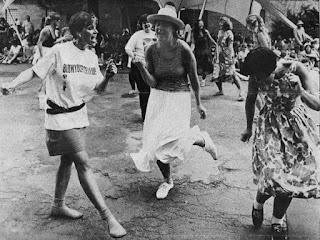Happiness I
Continuing my hubris....
"Pursuing happiness" is a big deal in this experiment called America. Public education is a big deal, too. Both are under fire.
I think a lot of unhappiness stems from our cultural break from our mammalian roots. (That's not a thesis, just an idle thought.)
While too many times ethnic celebrations in schools break down into match-the-food-with-the-culture, they do provide a teachable moment when a child of the dominant culture mutters "But I'm American-- we don't have a food."
And there may be some truth to that.
 |
| Clams from the bay, tomatoes from the garden. |
Mammals need to eat a lot of food, a cost of our warm-bloodedness. Most of our cousins spend a good part of their waking hours getting and eating food. Much of their social interaction revolves around getting (and sharing) food.
Until very recently (past hundred years or so) much of American social interaction involved the multiple steps needed to eat. We cheated a little bit of the time by using slaves, only considered 3/5 of the rest of "us" (and only considered human at all so the South could have a bigger voice in Congress), but still, much of any given day was dedicated to sowing, reaping, slaughtering, prepping, sifting, grinding, rolling, frying, kneading, baking, churning, chopping, hauling, and, well, eating.
Pretty much everything eaten was local and in season, and I'm betting also pretty good most of the year.
 |
| From our classroom, grown from a wheatberry |
How do I know? I am blessed with local, fresh food several times a month. Even in February, I can rake clams from the bay, pluck Brussels sprouts from the garden, cook the clams with rosemary and parsley from the garden, then chase it down with honey wine from my daughter's bee hive.
You do not need much space to do this, and
it doesn't even have to be yours.
My neighbors mostly plant grass. Not the good kind like wheat or oats or corn. Kentucky blue grass (which would be interesting if it were truly blue). Chewings fescue. Bermudagrass. All clipped before they give off a hint of sexuality.
If you have a southern window, you can nibble on fresh basil all winter long.
 |
| Basil on a windowsill. |
I teach children biology, or at least pretend to. Hard to teach children about life in a culture that uses Round-Up like water, in a culture where few children have slaughtered anything but mosquitoes, and where too few children have eaten anything they planted themselves.
So child by child I try to change this, but not so they can survive in some post-Apocalyptic world.
 |
| Carrot grown in our classroom. |
No, I just want them to have a shot at pursuing happiness.
What do you think hands are for?
































